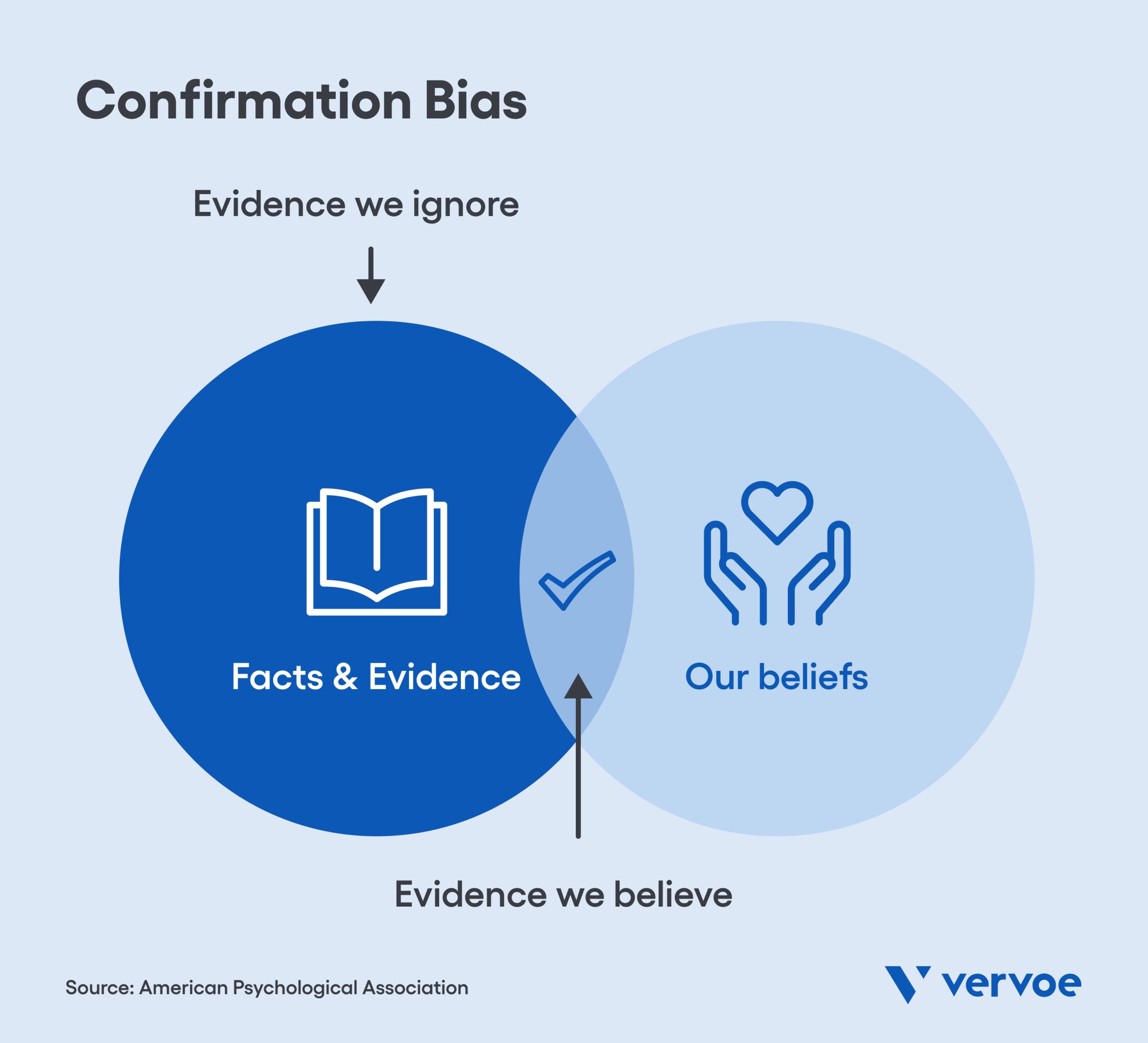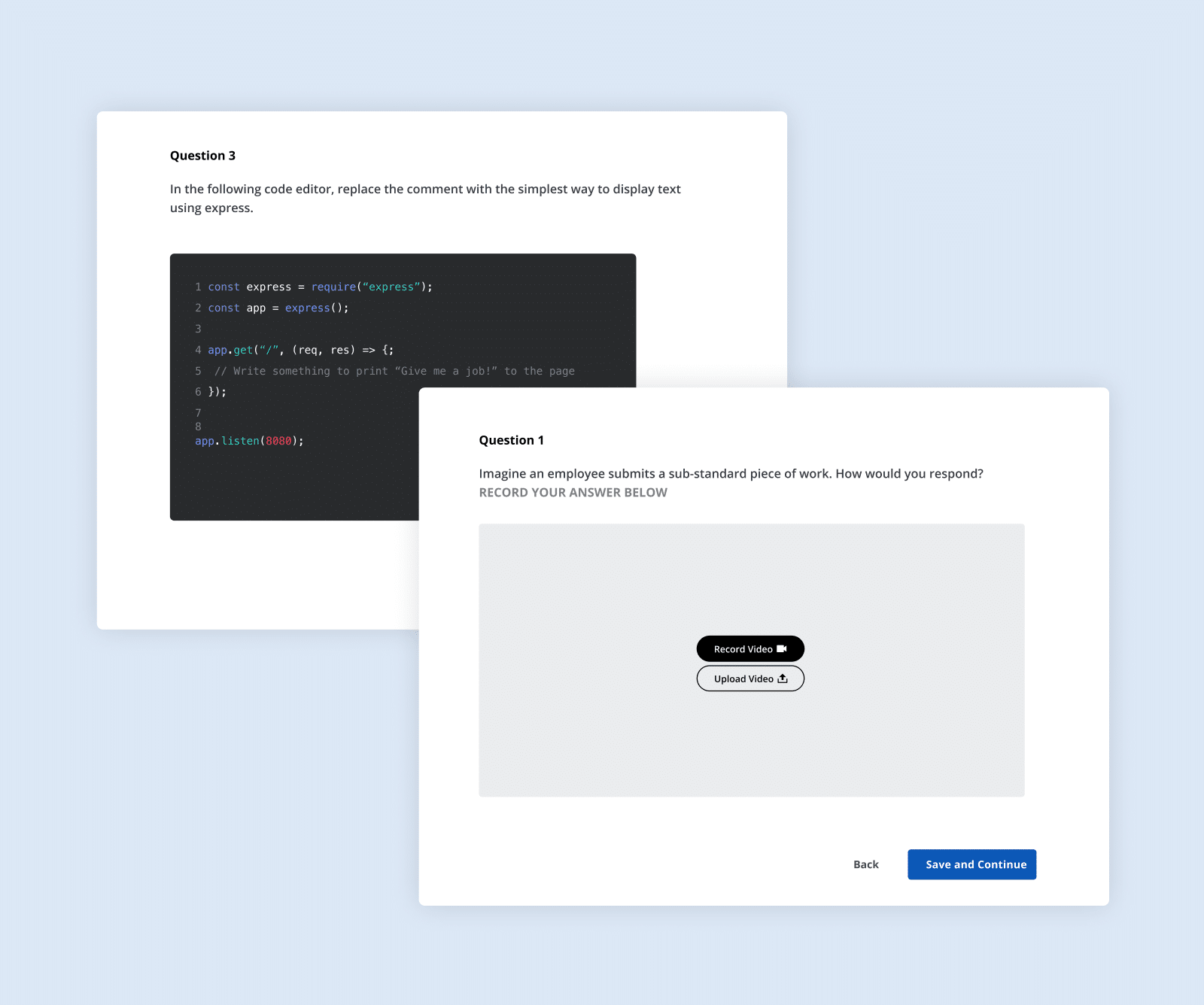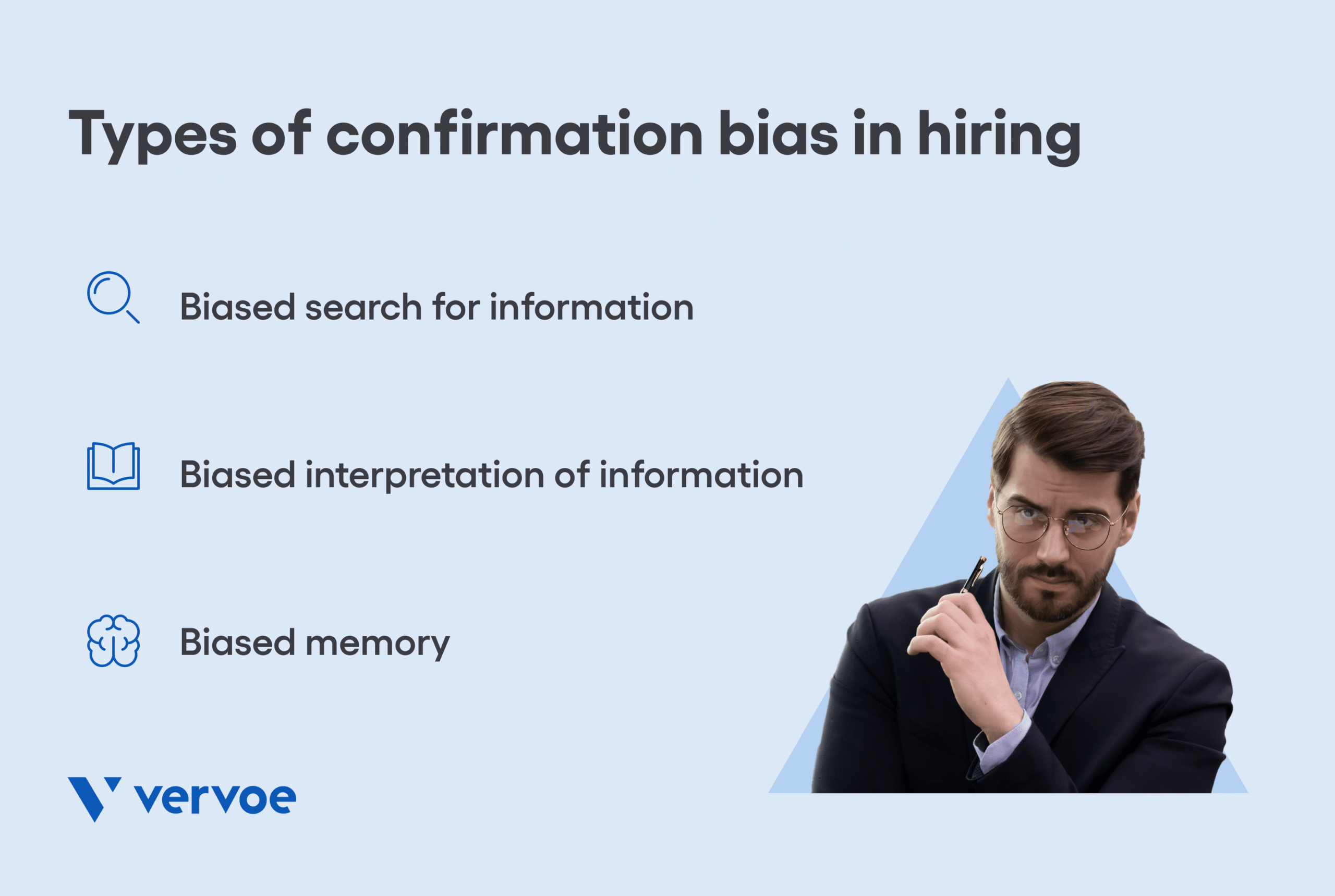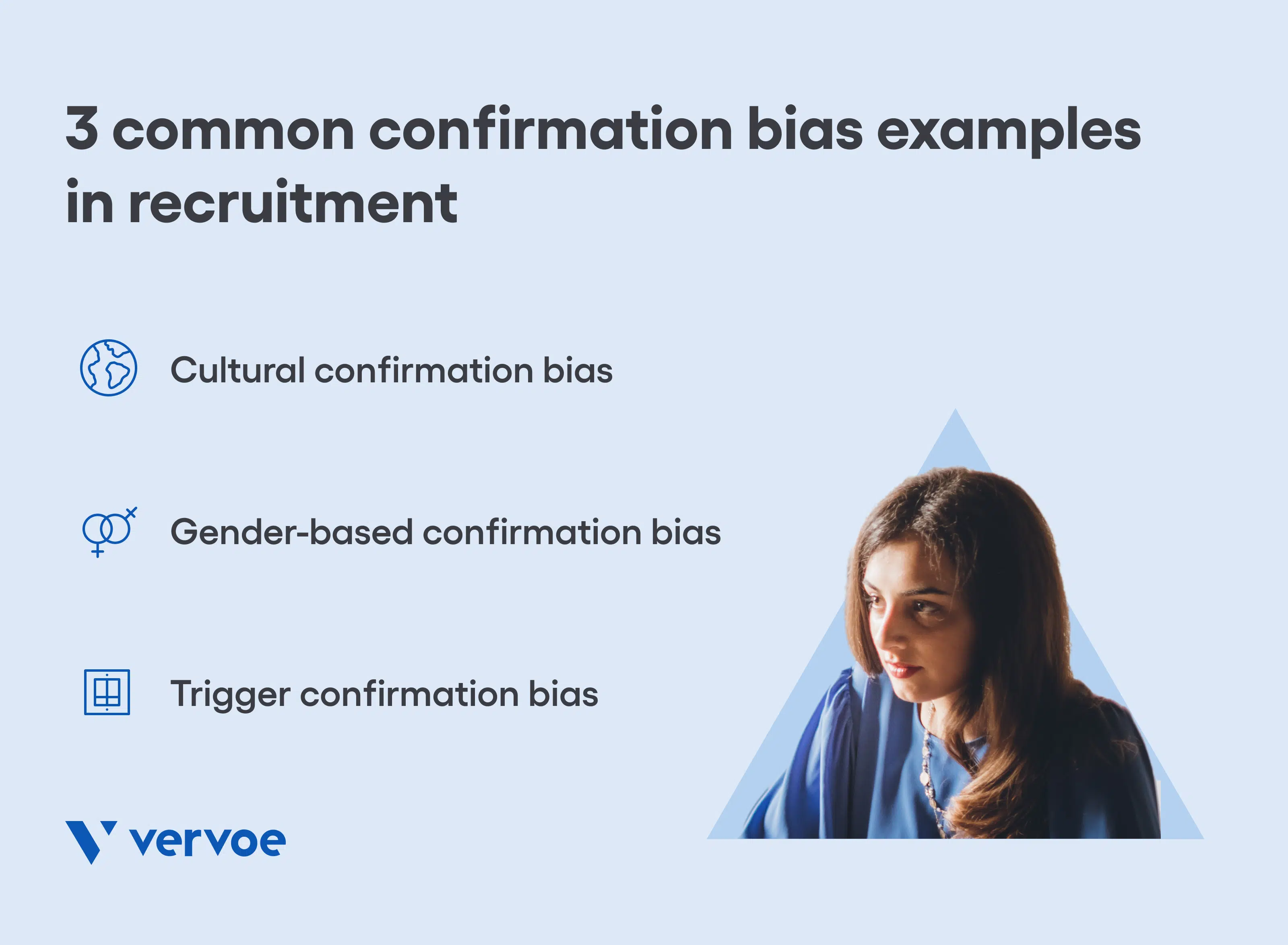When most of us think of bias in hiring, we think in terms of racial, gender, and maybe even age bias. There’s enough research out there to conclude that these forms of hiring bias are harmful to employee productivity and business growth, so we try to avoid them.
But, there are other less obvious types of hiring biases that cause just as much damage to businesses. One of them is confirmation bias — a form of unconscious bias.
According to inclusivity consultant, Dr. Pragya Agarwal, confirmation bias can lead to discrimination in the recruitment process because of preconceived ideas. For example, preconceived notions about different social groups and their competencies can rule out the best candidate for another who turns out to be less ideal in the long run.
Here’s everything you need to know about confirmation bias in hiring and how to avoid it.
What is confirmation bias in hiring?
Confirmation bias is seeking and favoring information that agrees with what you already think to be true, rather than evaluating all available data objectively. In other words, cherry-picking data to support your “intuition”, or innate beliefs about a candidate.
The American Psychological Association defines it as:
“The tendency to gather evidence that confirms preexisting expectations, typically by emphasizing or pursuing supporting evidence while dismissing or failing to seek contradictory evidence.”

In hiring, confirmation bias manifests as unconsciously looking for information that supports first impressions of a candidate’s skills. An impression is unfairly influenced by anything from how the candidate looks, to whether they went to an Ivy League College, or worked at a Fortune 500 company.
Focusing on irrelevant details that match preconceived ideas of who you think the best candidate for a job is can lead to overlooking skilled candidates, and poor hiring decisions.
For example, let’s say you come across a resume that stands out with impressive results, like a 30% conversion rate for a marketer, or a 50% close rate for a sales rep. During the interview, you unconsciously ask questions that help the candidate play up their strengths while you ignore weaknesses that may cause problems in the future.
This is confirmation bias.
Why does confirmation bias happen?
Research from the American Psychological Association finds that people naturally prefer to avoid the challenges associated with opening up to new beliefs. We also tend to seek reinforcement and confirmation that our personal beliefs are right just because we want them to be.
But there are other theories as well. Some people say that confirmation bias allows us to rely on preconceived ideas to process information faster. With the number of resumes recruiters have to comb through, this theory may not be far from the truth. Whatever the reason, the effects of confirmation bias remain harmful.
Types of confirmation bias in hiring
There are three types of hiring confirmation bias: biased search for information, biased interpretation, and biased memory.
Biased search for information
In this type of confirmation bias, a hiring manager or recruiter actively seeks information that supports their pre-existing beliefs.
For example, a hiring manager may search for evidence of shorter work sprints when a candidate lists travel as a hobby, in order to confirm their belief that people who like to travel hop between jobs a lot.
Or they could search a 20-year-old candidate’s Facebook profile to see if they love to party rather than assessing their LinkedIn profile for professional recommendations. That way, they can confirm their belief that younger people stay up late to party and show up at work tired and unproductive, leading to age discrimination.
Biased interpretation of information
With this type of confirmation bias, hiring managers will interpret data in a way that confirms their beliefs.
For example, let’s say that a recruiter holds the belief that people who graduate without a distinction are not smart enough and look for evidence of this in a resume. A candidate who graduated with a “B” and interned at a less prestigious tech company — where they had more opportunities to learn — becomes the candidate who wasn’t smart enough to secure a better internship.
Biased memory
This refers to a selective recall of information to confirm one’s own beliefs.
In a sales position, for example, hiring managers may recall a candidate’s extroverted skills more than their introverted skills when they have already decided the candidate is perfect for the job.
3 common confirmation bias examples in recruitment
Confirmation bias can manifest in many forms during the recruitment process. Here are the most common examples we’ve seen.
1. Cultural confirmation bias
Sometimes, hiring managers form bias against candidates based on cultural ideals. People acquire cultural biases from personal upbringing or societal influence.
Let’s say a hiring manager comes from a culture where tattoo-wearing is associated with violence and spots a candidate’s tattoo on their social media profile. They may become subject to confirmation bias with the hiring manager looking for evidence of conflict between the candidate and their previous co-workers.
2. Gender-based confirmation bias
If a hiring manager thinks a particular gender is more suitable for a job, they’re more likely to ignore professional evidence and search for information that confirms their beliefs instead.
Let’s say a position opens up on the sales team and two candidates — a woman and a man — with similar skills and experience emerge as frontrunners. The woman performs better than the man in a job-related skills assessment. But the manager chooses the man because he’s seen as a more “natural fit” for the role.
This is gender-based confirmation bias, with the hiring manager unconsciously adhering to the well-worn stereotype of the salesman and counting the woman out, even though she’s proven she can do the job as well if not better than the man.
3. Trigger confirmation bias
Experiences associated with a place or thing can trigger confirmation bias.
Say you notice a candidate from a particular school or area where you had an unpleasant experience. You may not focus on the candidate directly, but ask targeted questions to confirm your bias instead.
You’ve been triggered by a detail in their background and are have let that color your view of the candidate, unfairly.
How this type of unconscious bias in hiring limits your organization
Like all biases, confirmation bias can affect your organization in several ways. It can limit diversity efforts, employee creativity, productivity, and in turn, business performance.
In fact, confirmation bias can be the foundation and enabler for several types of hiring bias in the following ways:
- Beliefs about certain subgroups and the way they behave/work lead to subgroup confirmation bias. And when you “confirm” that you were right, that enables subgroup bias.
- Theories about certain gender types lead to gender confirmation bias and enable the more traceable gender bias to thrive.
Sadly, even tiny amounts of bias in the hiring process can lead to huge financial losses. Research by Oregon State University indicates that as little as 1% of gender bias in hiring can lead to 32 additional failed hires and a $2.8 million per year loss in productivity for companies that hire 8,000 new employees per year. Bump that number up to 4% and you have an additional 192 failed hires and $17 million in lost productivity.
How to avoid confirmation bias in your hiring process
We’re hard-wired to seek confirmation that we are right. Therefore, left to our own devices, confirmation bias is hard to overcome. However, with awareness and the right resources, you can avoid this form of bias and its negative effects. Here’s how…
1. Make skills assessments the first step in the hiring process
If you use trigger-based AI to filter candidates, there’s a big chance you’re losing out on high-quality workers. Ill-considered AI solutions that reject or progress candidates based on keywords on their resumes can introduce AI hiring bias. And AI matching tools can reject candidates based on results from previous applicants with similar backgrounds.
Bad AI solutions are everywhere. But skills assessments — like the ones we offer at Vervoe — take candidates’ backgrounds out of the mix and make hiring more about merit. When used well they remove the need to judge candidates based on where they worked, or how they perform in interviews. The focus instead is on what they can do. And our machine-learning AI actually helps reduce bias.
To use skills assessments for candidate evaluation you should:
- Determine what to test – Look at your job description and clarify what day-to-day tasks would look like for the role. Your test should judge the candidate’s understanding of the skills they need, their ability to use tools, and what soft skills they have.
- Use a recruiting tool to deliver your test – You’ll need a skills assessment tool that allows for multiple question formats and follows the candidate throughout the process so all your data is in one place, like Vervoe.

2. Create a consistent interview process
An interview process that asks everyone the exact same questions removes room for irrelevant details and levels the playing field. That way, only the best candidates can advance.
- Have a set list of questions to ask and record candidate answers using the same format — multiple-choice, detailed responses, audio/video answers — don’t mix it up between candidates.
- Resist the urge to become too conversational because it’s easy to derail from the questions you need to ask. A good idea is to keep unstructured conversations to the beginning or end of the interview, and not include those conversations in the candidate assessment at all.
3. Review resumes last, if at all
While resumes are important, they can be misleading. In a 2020 ResumeLab study, up to 56% of job seekers confessed to lying or stretching the truth on their resumes. If you rely on resumes to make hiring decisions, you may hire someone who doesn’t possess the qualifications they claim to have.
Have candidates go through a skills assessment early in the recruitment process. Then progress them to an interview. Leave the resume to last, or, even better, don’t look at it at all.
Confirmation bias is damaging and hard to spot, but not impossible to fix
It’s important to consider everyone when hiring, not just those that fit the mold of what you’re looking for. Unfortunately, confirmation bias doesn’t always give room for this. With awareness, however, you can work on improving the hiring process to include more seemingly ‘unconventional’ candidates, and you’ll likely find they end up being great additions to your team.
Start by leveling the playing field with skills assessments, but don’t forget to standardize your interview process too. That way, everyone gets a fair opportunity to answer the same questions and stand out based on merit.
Want to learn how Vervoe’s candidate assessment tool can help you eliminate confirmation bias? Schedule a free demo today.























